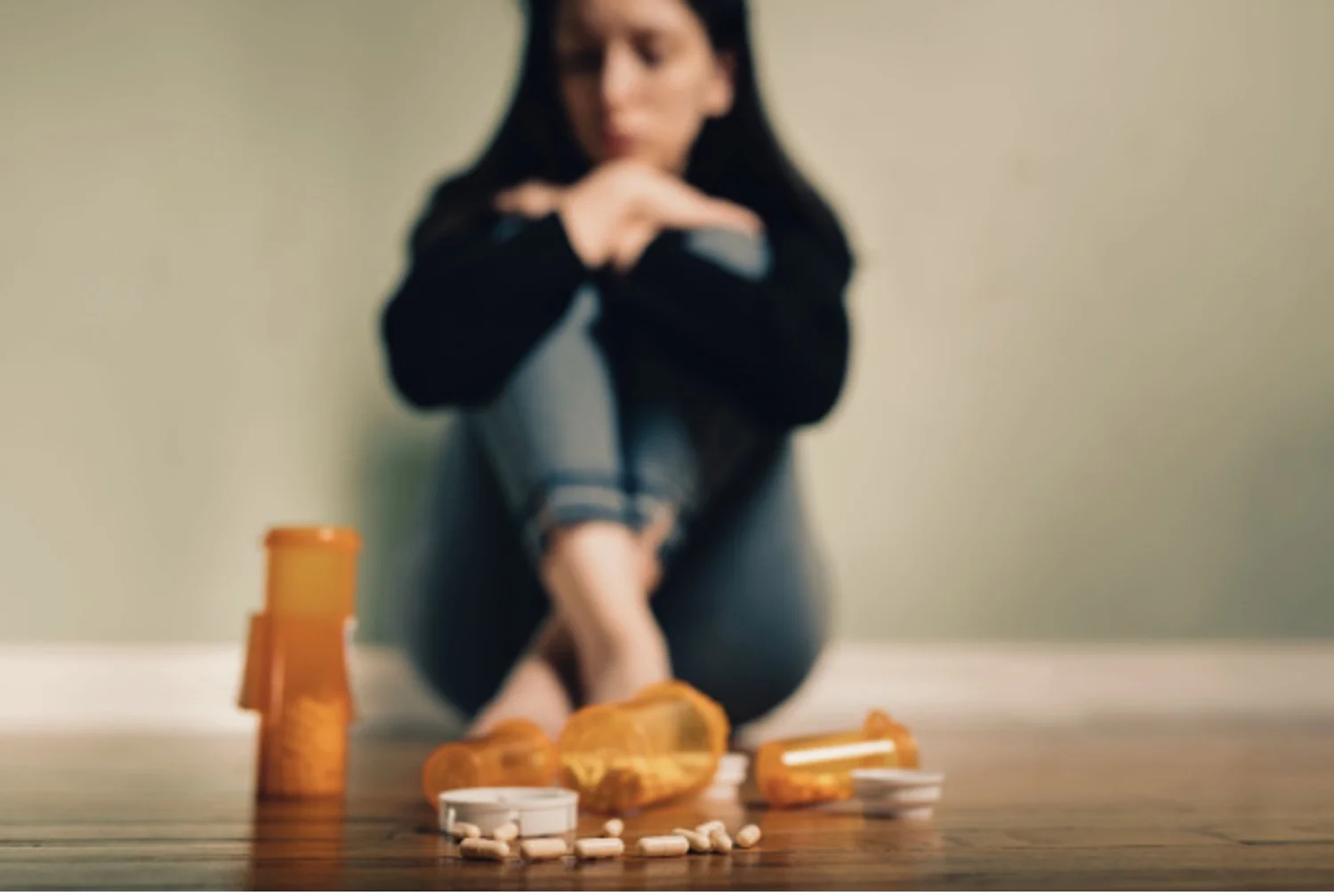Breaking the Chain: Exploring the Connection Between Depression and Addiction
Depression and addiction have a close and tragic relationship.
“Depression can lead individuals to seek relief from their symptoms and emotions, and substances may provide temporary escape or numbness,” says psychiatric mental health nurse practitioner (PMHNP) Valerie Puffenberger. “The use of substances can create a false sense of happiness or pleasure. Additionally, substance use may worsen the symptoms of depression in the long run, creating a cycle of dependence.”
However, a wide variety of treatment options are available that can dramatically improve the quality of life for addiction and depression sufferers.
Read on to learn more about how depression and addiction affect each other and the most effective treatment options for these co-occurring disorders.
Understanding Depression
Depression is one of, if not the, most common mental health conditions. At least 20% of adults experience at least one diagnosable depressive episode every year. And at least 7.1% of the U.S. population experiences major depressive disorder each year.
Depression is typified by intense feelings of sadness, hopelessness, and worthlessness, low energy levels, and low mood.
Some of the most common and/or serious types of depression include:
- Major depressive disorder (MDD): Also known as clinical depression or unipolar depression, MDD is a single occurrence or a series of recurrent depressive episodes that last at least two weeks.
- Persistent depressive disorder: Also known as dysthymia, persistent depressive disorder is a continuous and chronic state of low-level depressed mood. The symptoms are generally not as severe as those associated with major depressive disorder but are more persistent and just as crippling.
- Postpartum depression: Experienced by 1 out of every 9 women who have recently given birth, postpartum depression can affect any woman regardless of age, race, or economic background.
- Seasonal affective disorder: These depressive episodes typically occur in the fall and winter months and then dissipate in the spring and summer with warmer, sunnier weather.
- Psychotic depression: Psychotic features such as hallucinations and delusions accompany major depressive episodes typify this form of depression. These psychotic features are typically depressive in nature and focus on concepts such as guilt, worthlessness, or death.
What Causes Depression?
Depression is a complex condition that often has multiple causes. Here are some of the most common and important factors that influence whether an individual will develop depression:
- Genetics
- Neurochemical imbalances
- Hormonal changes
- Life history and experiences
- Trauma
- Chronic stress
- Social isolation
- Relationship issues
- Loss and grief
- Financial problems
- Substance misuse
- Giving birth
- Chronic illness
- Neurological conditions
- Mental health conditions
Understanding Addiction

Addiction is a disease typified by urges to use a substance or engage in a behavior. To have an addiction, you must have a physical and mental dependence on a substance/behavior, and you must experience negative impacts as a result of use or engagement.
When the focus of an addiction is a substance, like alcohol or opiates, it’s defined as a substance use disorder. When the focus of an addiction is a behavior, like sex or gambling, it’s called behavioral addiction.
Addiction usually starts when an individual experiments with a substance or behavior that gives them a temporary rush or relief. The individual continues to use and eventually develops a tolerance, meaning they must use more of the substance/behavior to get the same effect. This motivates ever-increasing use.
Eventually, their mind and body cannot function “normally” without the substance or behavior. If they stop or cut back, they will experience a number of uncomfortable and possibly dangerous symptoms known as withdrawal. This is known as dependence.
Over time, the individual begins to experience repeated negative consequences because of their tolerance to and dependence on the substance/behavior. And eventually, they develop a full-blown addiction.
Depression as a Risk Factor for Addiction
Depression is one of the single biggest risk factors for addiction. More than 20% of Americans with depression also have an active diagnosable substance use disorder, and some studies suggest that the lifetime prevalence of substance use disorders is much higher.
Similarly, more than 20% of those with a substance use disorder also have diagnosable depression. In fact, depression is the most common co-occurring disorder among those with substance use disorders.
There are many reasons why depression is a risk factor for addiction, but three of the most important are:
- Self-medication, or using an addictive substance/behavior to temporarily alleviate depressive symptoms
- Feelings of worthlessness, which can lead to greater substance misuse
- Isolation, which can worsen depressive symptoms and substance misuse
Self-Medication
Depression symptoms can be very hard for victims to get through, especially if they have not been properly diagnosed and treated by a clinical professional. Many addictive substances/behaviors alleviate or eliminate depressive symptoms, at least temporarily.
Depression sufferers may use substances/behaviors as a way of finding relief. And as their tolerance and dependence grow, the individual must use more and more.
Feelings of Worthlessness
The feelings of worthlessness that frequently accompany depression also motivate greater substance use. As the individual increases their use of the addictive substance/behavior, they experience severely negative effects.
Many people completely destroy their lives and those of their families. Feelings of worthlessness make depression sufferers feel as though they can’t get any better, making them ignore or even justify many of the negative consequences of addiction.
Isolation
Depression can cause feelings of isolation, which are often made worse by the behaviors and choices made by depression sufferers. In turn, isolation creates feelings of loneliness, and loneliness motivates substance misuse.
It is frequently said that addiction is a disease of loneliness. Not only do many addiction sufferers use substances to escape loneliness, but the actions they take in furtherance of their addiction destroy relationships and further isolate the individual.
The Impact of Addiction on Depression

Just as depression can cause or worsen addiction, addiction can cause and worsen depression. Some of the most common effects of addiction on depression include:
- Side effects of use: Depression is a side effect of many substances, including alcohol and opioids.
- Withdrawal: Depression is a symptom of withdrawal from many drugs, including benzodiazepines and MDMA, commonly known as molly or ecstasy.
- Perpetuating feelings of worthlessness and hopelessness: Continued substance misuse can lead an individual to act in ways that induce guilt and shame, further perpetuating depressive symptoms.
- Reinforces depressive behaviors: Addiction can reward some depressive behaviors—for example, staying in bed, isolating oneself from others, or avoiding meeting responsibilities—by making them more desirable or pleasurable.
- Negative consequences: Addiction can cause victims to behave and act in ways that can have severe, negative, depression-inducing consequences, including causing irrevocable relationship damage, arrests and jail time, financial distress, and loss of status.
- Strain on relationships and treatment: Addiction can put a major strain on relationships and make depression treatment far more complex and difficult.
Integrated Treatment Approaches for Depression and Addiction
Because depression and addiction are so closely related, it is virtually impossible to separate them when they co-occur. For this reason, patients must treat both at the same time to ensure a complete and lasting recovery. Otherwise, relapse is extremely likely.
The most effective treatment programs for depression and addiction are dual diagnosis programs. Dual diagnosis programs are designed to treat both addiction and mental health conditions like depression simultaneously.
Dual diagnosis programs use a variety of psychological techniques for treating depression, including:
- Cognitive behavioral therapy (CBT)
- Mindfulness-based techniques such as meditation and breathing
- Interpersonal therapy (IPT)
- Dialectical behavior therapy (DBT)
- Positive psychology interventions such as gratitude journaling and strengths-based approaches
- Behavioral techniques such as activity scheduling and social skills training
- Problem-solving therapy
- Self-compassion exercises
- Self-care training and routing
- Relaxation techniques
Some of the most common tools dual diagnosis programs use to treat addiction include:
- Medically supervised detox
- Medications to ease withdrawal symptoms and prevent relapse
- Life skills training
- Individual and group therapy
- Aftercare planning
- Trigger identification and management
- Identification of underlying causes of addiction
- Medical and clinical monitoring
- Drug and alcohol testing
- Support groups
Inpatient vs. Outpatient Dual Diagnosis Programs
Dual diagnosis programs can be classified as either inpatient or outpatient.
Inpatient dual diagnosis programs require patients to live at a facility where they are totally separated from their lives and triggers and provided with around-the-clock medical and clinical monitoring. Inpatient programs can be expensive, but they are usually more effective at treating co-occurring depression and addiction than outpatient programs.
Outpatient dual diagnosis programs require patients to attend treatment at a facility for several hours a day, several days a week, while residing elsewhere, providing them with the ability to continue to perform life responsibilities. Outpatient programs are usually less expensive—and less effective—than inpatient programs.
Recovering from Depression and Addiction

Once you’ve been treated for depression and addiction, you will enter “recovery.” You can think of recovery as a return to life, armed with tools to manage your addiction and depression. In recovery, the goal is to prevent relapse into substance use and/or depressive episodes.
There are many strategies that can help prevent relapse. Puffenberger recommends the following:
- Prioritize self-care and ongoing support.
- Attend regular therapy sessions to help manage depressive symptoms and addictive behaviors.
- Build a support system of understanding family, friends, and/or support groups.
- Engage in healthy coping mechanisms, such as exercise, hobbies, and practicing self-compassion.
- Establish a daily routine.
- Set achievable goals.
- Avoid triggers.
- Maintain open communication with your healthcare providers and seek help when needed.
Turning the Corner: Get Professional Help for Depression and Addiction
If you or your loved one is a victim of addiction and depression, you might believe you don’t have anywhere to turn. Luckily, nothing could be further from the truth.
Legacy Healing Center is dedicated to helping our patients overcome addiction and depression, along with many other substance use and mental health disorders.
We treat co-occurring depression and addiction using a three-pronged approach that employs the right medications, evidence-based psychotherapy, and peer support.
If you or your loved one is struggling with addiction and depression, you don’t have to wait another minute. Call 888-534-2295 today to speak with a treatment staff member at Legacy Healing Center.
Depression and Addiction FAQs
What is the relationship between addiction and depression?
Addiction and depression have a bidirectional relationship. This means that addiction and depression can cause and worsen each other.
Depression and addiction often trap victims in a downward spiral, in which worsening depressive symptoms motivate more substance use, and greater substance use causes worsening depressive symptoms. Because of this, patients must treat both conditions simultaneously to achieve recovery and prevent relapse.
How does sexual addiction contribute to feelings of depression?
Sex addiction, also known as hypersexuality or compulsive sexual behavior, can have a complex and intricate relationship with depression. Sex addiction can both cause and worsen depression, and vice versa. However, sex addiction can contribute to depression in a number of unique ways, including:
- The creation of a negative emotional cycle.
- Increasing isolation and shame.
- Causing interpersonal issues.
- Causing negative self-esteem and body image.
- Negative impacts on daily life.
- Serving as a means of escapism and avoidance.
What are some effective ways to help someone dealing with drug addiction and depression?
If someone you love is dealing with drug addiction and depression, you are probably desperate to help them in a healthy and effective way. Here are some tips and strategies to help a victim of depression and addiction:
- Encourage and enable professional help.
- Be non-judgmental.
- Offer emotional support.
- Educate yourself on their conditions.
- Help with research on their conditions, as well as treatment options and recovery strategies.
- Accompany them to treatment sessions and appointments.
- Encourage and enable healthy lifestyle choices and habits.
- Promote and nurture social connections.
- Avoid enabling behaviors.
- Be patient.
- Encourage and enable self-care and health coping strategies.
Can addiction be a symptom or a cause of depression?
Addiction can be both a cause and a symptom of depression. Similarly, depression can be both a cause and a symptom of addiction.
Sources
- Depression and Bipolar Support Alliance. (n.d.). Types of Depression.
- Depression and Bipolar Support Alliance (n.d.). Depression Statistics.
- National Library of Medicine. (2005). Mood Disorders and Substance Use Disorder. A Complex Comorbidity.
- Medical News Today. (2022). Is There a Link Between Depression and Substance Misuse?






